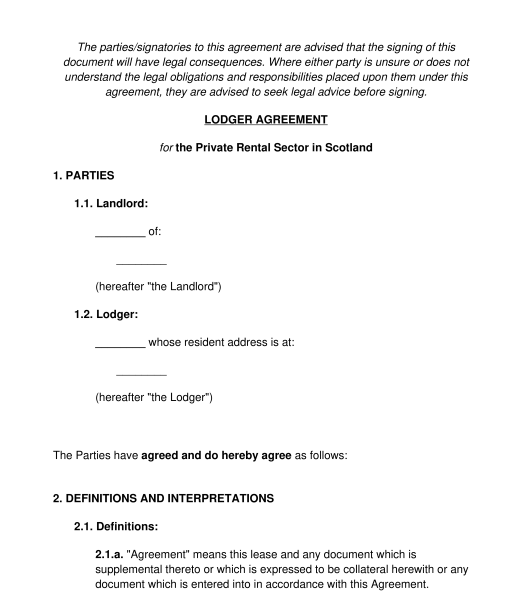 03/11/2025
03/11/2025

Answer a few questions and your document is created automatically.

Your document is ready! You will receive it in Word and PDF formats. You will be able to modify it.

 03/11/2025
03/11/2025
 Word and PDF
Word and PDF
 11 to 17 pages
11 to 17 pages



A lodger agreement is an agreement between a property owner and a lodger. The lodger will rent a room or space within a property from the property owner. The property owner will remain living in the property. This lodger agreement is designed for use in Scotland.
A different agreement should be used where the parties are resident in England.
A lodger will occupy a room or a space within a property and the owner will remain living in the rest of the property. A lodger agreement creates a common law tenancy, which is a contractual agreement between the owner and the lodger. A lodger agreement can be terminated with notice, as per the terms of the agreement.
A private residential tenancy is open-ended, meaning there is no fixed end date. In order to end a private residential tenancy agreement, a landlord must rely on particular legal grounds for eviction. Tenants under a private residential tenancy agreement will have specific rights.
No. It is not mandatory to have a written lodger agreement – a common law tenancy can be created and implied by spoken words or actions. However, it is helpful to have a written agreement so that each party has a clear understanding of the terms of the agreement.
Before creating a lodger agreement, a property owner should:
The parties may also wish to receive advice* before the agreement is finalised.
The lodger agreement will not be reviewed by a lawyer to ensure that the legal content applies to the personal situation of the parties. In order to receive advice about the particulars of this agreement before it is finalised, it will be necessary to instruct a lawyer. For this type of agreement, it is necessary to consult with a lawyer who is regulated by an approved regulator in the legal services sector. It is possible to search for a lawyer on the Law Society website.
The tenant and the property owner should be over the age of 16. Each party should have the legal capacity to enter into a contract. Capacity refers to a situation where a person has the ability to understand and make legal decisions for themselves.
A lodger agreement can have a fixed end date, or the parties can agree that the agreement will remain in force until further notice
The agreement should be signed by the parties. The parties may choose to sign the agreement in the presence of a witness. This can assist in proving the validity of the agreement
Each party should retain a copy of the agreement that contains the witnessed signature of both parties.
The property owner should also accurately fill in the inventory and record of condition before the agreement commences. A property inventory/schedule of condition will provide a summary of all the items (such as furniture and white goods) in the property and will note the condition of those items. This should be agreed upon and attached to the agreement once it has been signed and agreed by the lodger.
The tenant may occupy the property in accordance with the terms of the agreement. The property owner must comply with their duties as a landlord in a common law tenancy.
Whilst not mandatory, a lodger agreement can be witnessed, to help prove the validity of the agreement. Each party may therefore sign the agreement in the presence of a witness, who will then also sign the agreement. The witness should be an adult with capacity, who is not a party to the agreement.
The property owner should also accurately fill in the inventory and record of condition before the agreement commences. A property inventory/schedule of condition will provide a summary of all the items (such as furniture and white goods) in the property and will note the condition of those items. This should be agreed upon and attached to the agreement once it has been signed and agreed by the lodger.
Written notice can be provided to the lodger under the agreement if the owner wishes for them to leave. The notice will specify a move-out date. If the lodger fails to leave after this, a formal eviction process can be followed and a court order can be sought.
A lodger agreement must identify:
In Scotland, a common law tenancy is governed by contract. This means the terms will depend upon the agreement that has been reached between the parties.
The Housing (Scotland) Act 1998 (Part II) deals with protection from unlawful eviction.
You fill out a form. The document is created before your eyes as you respond to the questions.
At the end, you receive it in Word and PDF formats. You can modify it and reuse it.
Guides to help you
Lodger Agreement (Scotland) - Template - Word & PDF
Country: United Kingdom